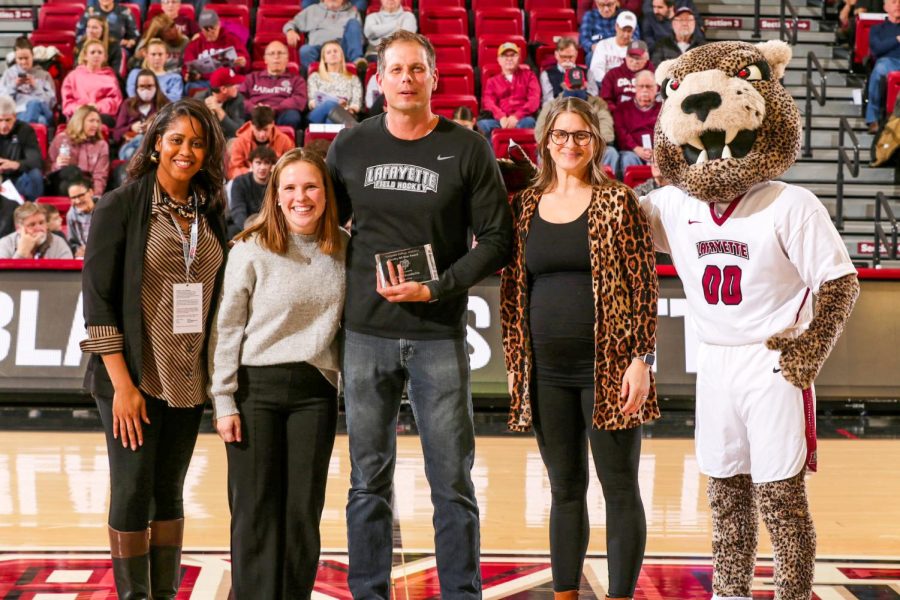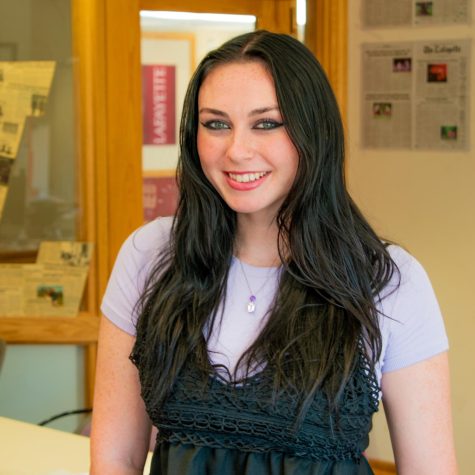Through challenges and triumphs, Lafayette’s faculty mentors are there to uplift student-athletes as they balance academics and athletics. These 20 faculty mentors support many of the college’s 23 Division I sports teams.
“For me, I think of myself as an informal advisor of sorts to the students on the field hockey team,” geology professor Dave Sunderlin, who is the field hockey faculty mentor, wrote in an email. “Think-tanking with each of them on how they can achieve balance, and be their best in their academic and athletic lives, and beyond.”
Over the past month, “Faculty All-Stars” have been recognized by the Athletic Department at basketball games for their support of student-athletes. One of these standouts was Sunderlin, who was nominated by senior field hockey player Felicitas Hannes. He was honored at the game on Feb. 22.
“He is interested in how the team is doing athletically … and individually,” Hannes said, according to the GoLeopards Instagram. “He is a great supporter of athletics, student-athletes and is very accommodating to make the life of student-athletes better at Lafayette.”
Sunderlin encourages his mentees to swing by his office at the beginning of each semester.
“After that, they all know they are welcome to drop by anytime to celebrate their successes, think through challenges, or just talk,” Sunderlin wrote. “I see some of the students almost every week, but keep up with all of them via email, out walking on the quad, or at their games.”
Junior Class Dean and College Transitional Specialist Abby Close, who serves as the faculty mentor for cross country and track, wrote in an email that faculty mentors may attend team meetings, offer workshops, schedule individual meetings or attend the team’s athletic events.
She said that much of the support she provides to student-athletes does not differ much from the support she provides to any other student on campus. Close can relate with her students as she has experience as an athlete at both the Division I and Division III levels.
“The members of the team are aware that I was also a student-athlete and that I can personally relate to what they are going through both now and upon graduation,” Close wrote in an email. “I often share my experience navigating college as a student-athlete, which I find resonates with them. I have found that all students, whether a student-athlete or not, gravitate to hearing about personal lived experiences and how their situation can relate. It really helps further develop the relationship.”
Sunderlin said that he aims to support the student-athletes in ways that are logistical, such as thinking through various resources available to them, but also supporting them by just being a friendly face they can chat with about academics and more.
“Having now been a faculty mentor for a while, I have seen a lot of success stories among the student-athletes and watched how each student has uniquely created that for themselves,” Sunderlin wrote. “I enjoy brainstorming with each person about possible ways they could get to where they want to be.”
Sunderlin often meets with the entire team alongside head coach Jennifer Stone.
In addition to working with current students, both Sunderlin and Close said that in their role they have the opportunity to meet with prospective student-athletes and families and discuss resources with them.
“I often have short meetings with recruits that are on campus for a visit, describing the stimulating academic life here at Lafayette and answering questions they have about this great place,” Sunderlin wrote.
“Faculty mentors are just one layer of support for our student-athletes. For all Lafayette students, as mentors, we are here to be visible, present, a listening ear, and someone who can point students to the correct resource given whatever circumstance may arise,” Close wrote. “This is of course, all while empowering them to be confident, inclusive, and stand out members of the Lafayette community.”























































































































